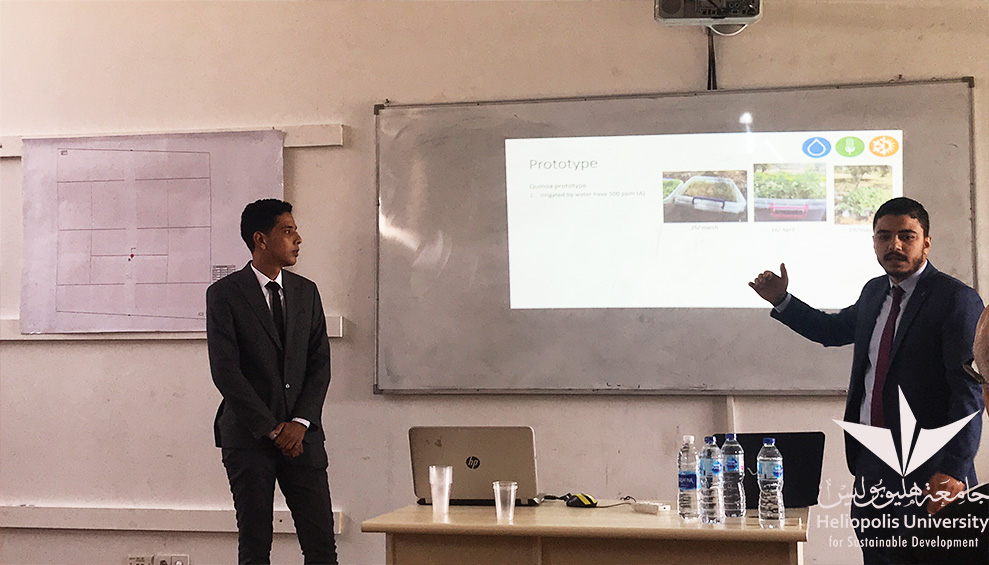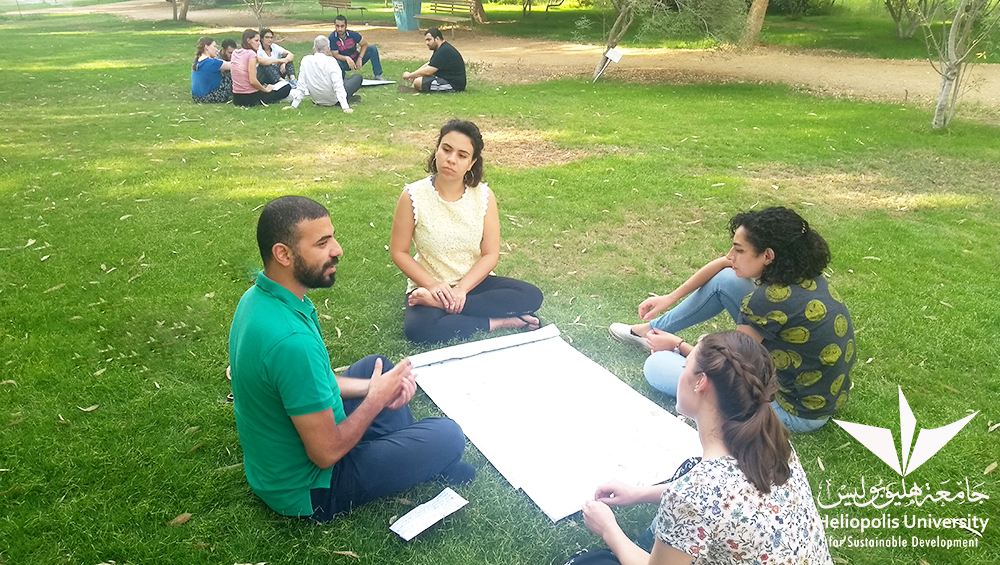
[:en]2018 Graduation Projects: The Water-Energy-Food Nexus[:ar]مشاريع التخرج ٢٠١٨: مثلث الماء – الطاقة – الغذاء[:]
[:en]Water scarcity is one of the growing challenges that Egypt has been facing for many years. The country’s per capita water resources are in a continuous drop. Besides, more than 80% of Egypt’s water resources are consumed in agricultural applications. Hence, improving the water management is becoming more and more important. Anas Azzam and Mostafa Osama, students at the Engineering department of Heliopolis University have recently proposed their graduation project in this regard. Entitled WEF Nexus, the project provides a conceptual approach that focuses on the interconnections and linkages between the security of Water, Energy, and Food. “The nexus in our case will include using sprinkling and dripping irrigation systems, in order to maintain high water productivity,” says Mostafa Osama. “Also closed loops of subsurface drainage systems are encompassed for an optimal use of water in irrigation,” he adds. The two students designed a prototype system of cultivated boxes that contain jojoba and quinoa to be placed in El-Moghra farm, a selected study area, located in Al-Wahat Al-Bahriya. “Our aim is to test the resilience of these crops to the salinity of the water, and monitor their adaptation to climate change,” says Anas Azzam. The whole system is meant to cultivate Bioenergy crops, which include jojoba, quinoa, and jatropha. Those crops are well-known for their drought resistance, as well as for the high nutritive value that classifies them as superfoods. Supervised by Dr. Tamer El-Gohary, the two Heliopolis University students succeeded to present such an innovative solution, hoping to be adopted on the local level in the near future. Hagar Ahmed [wonderplugin_slider id=14] [:ar] تعد ندرة المياه أحد التحديات المتنامية التي تواجهها مصر لسنوات عديدة، مما ينعكس في الانخفاض المستمر للحصة المائية للفرد. إلى جانب ذلك، تستهلك الزراعة في مصر أكثر من 80٪ من مواردها المائية. لذا أصبح تحسين إدارة المياه يعد أكثر أهمية عن ذي قبل. وقد قدم الطالبان أنس عزام وموسى أسامة، من قسم الهندسة بجامعة هليوبوليس مؤخراً مشروع تخرجهم كاقتراحٍ في هذا الصدد. تحت عنوان WEF NEXUS – أي الصلة بين الماء والطاقة والغذاء – يركز المشروع على تقديم منهج مفاهيمي يتناول حلولًا لتعزيز أمن ذلك المثلث. يقول مصطفى أسامة: ’’في مشروعنا يشمل المثلث WEF استخدام أنظمة الري بالرش والتنقيط تحقيقًا لإنتاجية عالية من المياه”. ويضيف قائلاً: ’’تُشمَل أيضًا حلقات مغلقة من أنظمة التصريف تحت سطح الأرض للاستخدام الأمثل للمياه في الري”. قام الطالبان بتصميم نظام نموذجي للصناديق المزروعة التي تحتوي على الجوجوبا والكينوا ليتم وضعها في مزرعة المغرة، وهي منطقة دراسة مختارة تقع في الواحات البحرية. يقول أنس عزام: ’’هدفنا هو اختبار صمود هذه المحاصيل لملوحة المياه، ومراقبة تكيفها مع التغير المناخي‘‘. ويهدف النظام بأكمله إلى زراعة محاصيل الطاقة الحيوية، والتي تشمل الجوجوبا والكينوا والجاتروفا. وتشتهر هذه المحاصيل بمقاومتها للجفاف، فضلاً عن قيمتها الغذائية العالية التي تضعها في التصنيف الغذائي كـ “سوبرفوود”. تحت إشراف الدكتور تامر الجوهري نجح الطالبان في جامعة هليوبوليس في تقديم هذا الحل المبتكر على أمل أن يتم اعتماده على المستوى المحلي في المستقبل القريب. هاجر أحمد [wonderplugin_slider id=14] [:]


